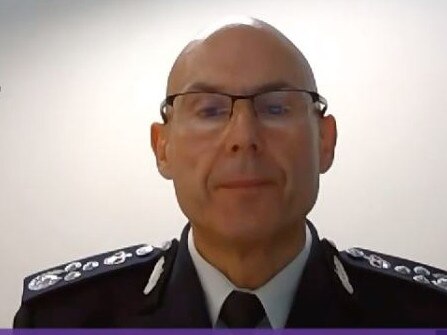Hotel inquiry: Andrew Crisp wanted navy to stop cruise ships
Emergency Management Commissioner Andrew Crisp called for the ADF to intervene when he heard two cruise ships were preparing to dock in Melbourne, the hotel inquiry has heard.
Coronavirus
Don't miss out on the headlines from Coronavirus. Followed categories will be added to My News.
Emergency Management Commissioner Andrew Crisp wanted a navy blockade to stop cruise ships entering Port Phillip Bay.
The exchange, on March 27 as the state was preparing to quarantine returning overseas travellers in hotels, was captured in audio recordings tabled at the hotel quarantine inquiry on Tuesday.
Mr Crisp reacted strongly to hearing two cruise ships were preparing to dock in Melbourne.
“It’s where we night need a bit more help from the ADF, we need a navy blockade so the ships can’t get close to Victoria,’’ he said.

An unnamed person told him the ships were to arrive at Station Pier over the next two days “purely to resupply,’’ before heading to the US.
Mr Crisp quickly dropped the issue after replying this is “very useful”.
Audio recordings of three crucial State Control Centre meetings on March 27 and 28 were tabled on Tuesday, showing government departments trying to set up mandatory 14-day quarantine periods with less than 36 hours’ notice.
The recordings show there was confusion over whether commonwealth or state laws would be used to enforce the quarantine and who was in charge, before that responsibility was transferred from jobs to health department.
Mr Crisp is heard in a March 28 recording saying the control agency “is the Department of Health and Human Services for this operation”.
But in evidence before the board on Tuesday, DHHS secretary Kym Peake refused to concede her department had ultimate responsibility.

“I certainly agree that we provided a co-ordination function, but my view is that there was a joint operation on the ground that shared accountability for the program (which) is reflected also by the fact that the appropriation for the program continued to sit with the Department of Jobs, Precincts and Regions,” she said.
As with all government witnesses, Ms Peake told the inquiry she did not know who decided to hire private security for hotel quarantine.
Earlier, DJPR secretary Simon Phemister said his department was “directed’’ to hire private security guards by the State Control Centre at a meeting on March 27.
He said he was “not involved in that decision-making process” and doesn’t know who made the decision.
“All I know is that we were commissioned to procure private security in that 4.30 meeting,” Mr Phemister said.
Counsel representing Victoria Police, Dan Star QC, said there was no evidence any such direction had been given.
WhatsApp messages released by the inquiry also showed that DJPR’s “employer engagement team’’ warned each other on March 27 of the dangers of using private security companies.
“Got to be careful with a lot of security companies. Heaps of cash work,’’ one person said.
“Cowboy industry’’ said a second message, while a third noted: “need to be reputable. Don’t want (redacted) rogue (redacted) prowling the corridors’’.
Mr Phemister also revealed he briefed his Minister, Martin Pakula, “very rarely’’ because Operation Soteria was being run through the State Control Centre.
Mr Pakula will give evidence to the inquiry on Wednesday.
Counsel assisting Rachel Ellyard told the inquiry that Unified Security was charging $49.95 an hour for a day shift during the week for its security guards, compared to $44.25 for MSS and $45.21 for Wilson.
MORE NEWS
Only two new virus cases east of Melbourne’s CBD

